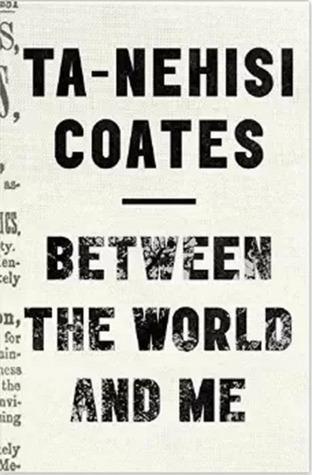Book: Between the World and Me by Ta-Nehisi Coates
Genre: Nonfiction
Publisher: Spiegel & Grau
Publication date: 2015
Pages: 152
Source: Library
 A letter to Coates’ teenage son
A letter to Coates’ teenage sonSummary: Written as a letter to the author’s 15-year-old son as he grieved about the non-indictment of the killer of Michael Brown, Between the World and Me contains autobiography, explorations for all Americans about race, and the sort of advice we all wished we got at age 15 about how to live a rich and fulfilling life.
As a librarian, I loved these descriptions of how Coates learned while at Howard University (also known as The Mecca):
I needed more books. At Howard University, one of the greatest collections of books could be found in the Moorland-Spingarn Research Center, where your grandfather once worked. Moorland held archives, papers, collections, and virtually any book ever written by or about black people. For the most significant portion of my time at The Mecca, I followed a simple ritual. I would walk into the Moorland reading room and fill out three call slips for three different works. I would take a seat at one of these long tables. I would draw out my pen and one of my black-and-white composition books. I would open the books and read, while filling my composition books with notes on my reading, new vocabulary words, and sentences of my own invention. p. 46
I was made for the library, not the classroom. The classroom was a jail of other people’s interests. The library was open, unending, free. Slowly, I was discovering myself. p. 48
Thoughts: I heard Ta-Nehisi Coates on the radio twice this week. Fresh Air and The Diane Rehm Show both rebroadcast interviews with him from earlier in the year. I suspect they selected his interviews for rebroadcast for two reasons. One, Between the World and Me won the National Book Award for nonfiction in 2015 so honoring this book is a good end-of-year activity. Two, the issues that Coates discussed in his book and interviews about it are relevant, always and again, this week when it was announced that the officer who killed 12-year-old Tamir Rice would not be indicted by a Cleveland Grand Jury.
From Between the World and Me:
At this moment the phrase “police reform” has come into vogue, and the actions of our publicly appointed guardians have attracted attention presidential and pedestrian. You may have heard the talk of diversity, sensitivity training, and body cameras. These are all fine and applicable, but they understate the task and allow the citizens of this country to pretend that there is a real distance between their own attitudes and those of the ones appointed to protect them. The truth is that the police reflect America in all of its will and fear, and whatever we might make of this country’s criminal justice policy, it cannot be said that it was imposed by a repressive minority. The abuses that have followed from these policies—the sprawling carceral state, the random detention of black people, the torture of suspects—are the product of democratic will. pp. 78, 79.
If dead 12-year-olds at the hands of police officers is not what we want, than it’s high time to envision a different sort of policing, one that imposes our will that America be something greater than our fears. Personally, I like the vision provided by this video where British police use their training, colleagues, and time (not guns) to safely disarm a machete-wielding man. And, I like the vision that is represented by the Campaign Zero project. As a 50-something white woman, I want to express courage rather than fear and say, loudly, that I want the justice system that operates in my name to be different than it is because I believe that it can be better than it is.
When I’m discouraged by what appears to be little progress in the year since the death of Tamir Rice, I find this mostly bleak passage oddly uplifting:
The fact of history is that black people have not—probably no people have ever—liberated themselves strictly through their own efforts. In every great change in the lives of African Americans we see the hand of events that were beyond our individual control, events that were not unalloyed goods. You cannot disconnect our emancipation in the Northern colonies from the blood spilled in the Revolutionary War, any more than you can disconnect our emancipation from slavery in the South from the charnel houses of the Civil War, any more than you can disconnect our emancipation from Jim Crow from the genocides of the Second World War. History is not solely in our hands. And still you are called to struggle, not because it assures you victory but because it assures you an honorable and sane life. pp. 96, 97.
That call to struggle rings true for Ta-Nehisi Coates, for his son, and for me.
Appeal: For all Americans (that’s why it won the National Book Award).
Have you read this book? What did you think?

